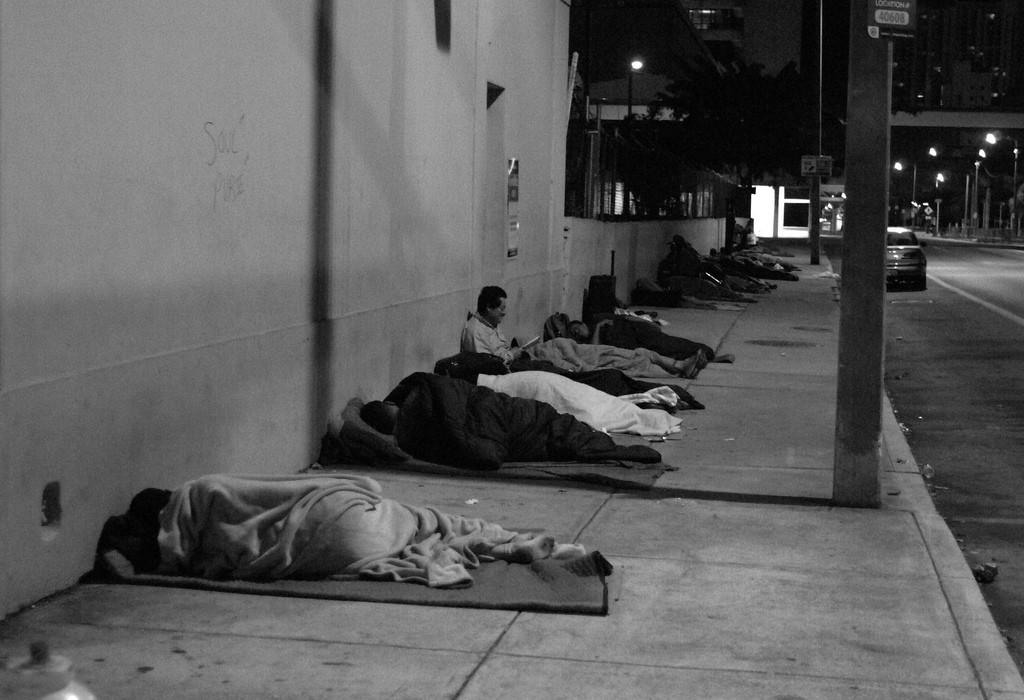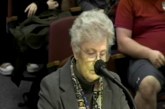

By Macy Lu
DAVIS — As individuals and families continue to be impacted by the worst economic contraction since WWII, concern for the increase of unsheltered community members has been on the minds of more than a few Davis residents, including those on the Police Accountability Commission (PAC).
In an effort to learn more about how Davis has been mitigating homelessness during the pandemic, the PAC invited Deputy Director of Police Services Deanne Machado to provide insight on the city’s response during their February meeting.
“Our homeless outreach needs have increased quite dramatically over the past year specifically,” Machado highlighted in her opening statement.
The Homeless Services Outreach Unit is the unit the city created to address those needs. Though nestled under the police department, it comprises only civilian workers who use non-policing, “trauma informed” tactics in supporting the unhoused.
“We do not typically stick with a client for more than what is necessary to solve an acute issue,” Machado emphasized. “There are some exceptions to that, but generally speaking, it is an upfront intensive support model.”
“We are not social workers…we are out there in the field assisting in the moment,” she said. “It’s proactively meeting folks where they are,” and that includes “directly in the encampments, hotels [and] downtown.”
“Our part ends when the client is successfully referred to a partner-agency program…that’s our number one goal,” she clarified.
In partnership with local organizations such as Homeless and Poverty Action Coalition (HPAC), Continuum of Care for Yolo, CommuniCare Health Centers and Interfaith Rotating Winter Shelter (IRWS), the unit links individuals to resources that can meet essential needs such as food, shelter and transportation.
When outreaching, the unit workers often bring food as a way to directly provide for people and as a conversation starter for introducing people to the respite center, which also offers laundry facilities, showers, internet and linkages to services such as healthcare and psychiatric treatment.
As for shelter provision, the team serves as a “gateway” to services such as Project Roomkey–shelter for unhoused, medically vulnerable individuals during the pandemic–and Davis Emergency Shelter Program. The team also has a supply of hotel vouchers, which guarantees folks in “really, really emergency situations” a minimum of 8-weeks shelter.
To prevent an overlap of services, the unit partners with the county for individualized case management, including behavioral and mental risk assessments. This creates a “general warehouse of data that the county oversees and that [the city] has access to, so everyone is on the same page.”
In light of social-distancing standards, the team no longer gives transportation for people personally; however, as Machado underscored, they still assist people by handing out bus passes, booking them rideshare transportation and purchasing Amtrak or Greyhound tickets for those who have long-term residence outside of town.
When asked how the pandemic has affected their approach to outreach, Machado replied that during their outreaches, the workers pass out PPE such as masks, refer people to Davis testing sites and loop in CommuniCare to oversee the potentially infected.
As for plans to vaccinate the unsheltered, Machado clarified that though those have yet to be hashed out, she’s “sure there will be a role for us to play” when the right time comes.
Assistant City Manager Kelly Stachowicz added that “the challenge is nobody knows when that’s going to be.”
To answer one commissioner’s question regarding the number of calls her team receives on average, Machado replied, “Gosh, we are on many, many calls a day.” Last month alone, the police department logged around 136 calls from the community regarding homelessness. Including the number of calls from their partner organizations, that number should be even higher.
The Vanguard reached out to the city’s Records and Communications Manager to question how many monthly calls the unit receives but has not received a response.
While this is a testament to the indispensableness of the homeless outreach unit, it raises the question of whether the city is doing enough to mitigate the need for intervention services in the first place.
Mayor Gloria Partida recalled noticing an unsheltered “elderly woman who is in a wheelchair” each morning when she would drop off her son.
“How does a person who is elderly, disabled end up in that situation? Where were the safety nets?” Partida pondered.
“And there are examples of that, sadly, everywhere,” Machado added, “cases like that where you wonder what happened there. And we feel so much empathy around that.”
However, mitigation on the city- or even county-wide level may not be enough when it comes to tackling local homelessness.
In response to a question on people’s place of origin, Machado stated, “I can just tell you anecdotally speaking, that we have a lot of new faces in town, people who were otherwise unfamiliar to us with no history.”
With over 151,000 people homeless in California (this number has likely risen since the last official count in 2019), Machado’s statement, though grim, is unsurprising. It magnifies the reality that homelessness in Davis is only a single node in a larger nexus that requires more than the efforts of a single town to resolve.

Macy is a junior from Orange County, CA, studying Communications and English at UC Davis. She loves meeting people, reading books, and writing creatively.





Oh, goodie! Another article that ends with me being accused of being “hostile towards the homeless” in comments.
I am so looking forward to the conversation, friends!
Let me rephrase that: so-called friends 😐
Funniest comment of the week, for sure.
My so-called friends sure didn’t think so.
So let me get this straight, you are trying to provide the essential needs such as food, shelter and transportation as well as providing a respite center that offers laundry facilities, showers, internet and links to services like health care and psychiatric treatment and as an extra added bonus you are handing out bus passes, booking them rideshare transportation and purchasing Amtrak or Greyhound tickets for those who have long-term residence outside of town.
With all that being said somehow you are surprised to see an uptick in homeless people in Davis? How’s this for an idea stop providing all of the above and simply provide them good old-fashioned work give them some dignity I believe that’s what they need more than anything and see what happens. You might be pleasantly surprised.
This goes to the old adage, “You want more of something? Subsidize it.”
Of course the man who said that is also shut down our states’ mental health facilities. Not that they were any shining pearl of humane treatment at the time, but people wandering our cities unable to care for themselves and unleashing profanity at space aliens isn’t the answer either.
I remember decades ago when Davis (and many other municipalities) would buy certain homeless persons a Greyhound ticket (yes, we used to have a Greyhound station). It just wasn’t a round trip.
Nevada was (in)famous for that… helped increase population in Sacto and LA… called “dumping”… and that was within a decade ago… and the “certain” homeless folk were generally those with diagnoseable MH issues…
You haven’t interacted much with the local homeless population, have you?
Your concept might work for a few, but health (physical and mental), alcohol/drug dependancy, shelter, food, hygiene, etc., means ‘dignity’ is the least of the problems…
However, you make a good point, albeit probably unintentionally… productive work, SHOULD be a part of the regimen… but not “alone”… the ‘dignity’/self-image piece is VERY important to solving the underlying, and behavioral problems… as to,
I only see same-same, more morbidity, and death, if ‘work alone’ (and you didn’t say ‘paid’) is the approach/strategy… well, slaves were actually better treated in the South…
Maybe five ago I was biking through downtown and someone working outside flagged me down and asked me about something I had – might have been a bike mirror (?), I think. But he really wanted one and wanted to know where to get one. He said he was in a pilot program with the City that found work for homeless people and he was cleaning the streets downtown for pay.
I happened to have several of the mirrors at home and as I was only a few blocks from home I went home and came back and gave one to him. It was like an $10 item and he insisted on paying for it. I had to practically force him to accept it as a gift.
Anyway, it seemed like a great program and I remember reading about it at the time, but haven’t heard about it in awhile. Anyone know if that program is still going on?
Alan… thank you for doing a mitzvah, as I understand the term, one definition being a good deed, spiritually based.
I hope someone, who knows, answers your question about whether the pilot program “got legs”… I strongly agree that the program has strong merit, a “piece of the puzzle”… but many need more than just that…
Most folk in the old WPA had at least shelter, perhaps some food… of course, they had no access to medical/MH care…
I think DS posted it below disconnected from my question . . . I think it was the “Pathways” that he referred to. Does anyone know if that program went on to be permanent? From everything I read about it, that was a program with some real legs that offered a path forward (rather than ‘throwing money at the problem’).
Still have a website: https://davispathways.org/
But nothing new since 2017. I know there is another group that might be more active at this point (blanking on the name).
Actually, I think it illustrates the difficulty of implementing programs like this and the limited success of outcomes. Yes, an update would be great. But the fact that there isn’t an update there says a lot.
Chris
Who do you think should pay for said work?
Hi Chris,
I certainly agree about the value of work. Problem is that there are major impediments to getting jobs for folks who are homeless — usually there are multiple issues that need to be addressed. Very few employers are likely to take on someone who has limited job skills, no address, major gaps in employment history, and who presents themselves poorly for an interview. And larger employers typically require a drug test.
Jobs programs funded by cities and counties tend to get good coverage, but outcomes are not outstanding in terms of the numbers of successful outcomes.
Here is an example that was set up locally about four years ago.
https://www.davisvanguard.org/2017/08/pathways-employment-another-possible-solution-homeless-problem/
Don
This homeless crisis should be solved by the business community not government.
The only role I would like to see the state of California perform is to simply get the heads of large and small corporations in one room to work this problem out and I believe this problem can be worked out with minimal cost to the public this doesn’t have to be a large burden upon the taxpayer.
By the way thank you very much for posting articles like this on the Vanguard.
I don’t see how the homeless crisis can be solved by the business community unless you are advocating they pay for permanent supportive housing, substance abuse treatment and mental health services – that seems to be the realm of government not business to me. THis is not just a matter of getting people jobs.
These both showed up this afternoon:
I’m sensing a pattern here.
“I want it all, and I want it now!” (Queen)… another ‘pattern’ of late…
Yes Alan I think you have good sense 🙂
I’ll bet I could list a dozen other Vanguard subjects du jour who’s headlines could all end with, “It’s Not Enough” after large amounts of resources had already been devoted to the cause, du jour.
These both showed up this afternoon:
Student Opinion: Biden’s Racial Equity Executive Orders Won’t Be Enough
I’m sensing a pattern here.
Thanks for bringing this subject up I have a question is anybody ever performed a racial breakdown of how many of the homeless are black how many are Latinx and Asian I don’t think that we have racial equality here I think Davis ought to fix this problem this could turn into a big issue going forward 🤓 somebody should get a hold of the White House maybe Biden can break out his official presidential crayons and write out of new executive order
From my experience with the local homeless, we’d need to recruit (or draft?) more POC’s, women, LGBTQ++ to balance the ‘equality’ scale… I don’t suggest doing that, tho’… not a good thing…
Uh oh . . . You’re supposed to say they are all locals. That’s the “line”.
Cat’s out of the bag now.
There have also been the ‘faux homeless’… “Romas”, others, posing as homeless, ‘desperate’, then getting into their late model SUV/mini-vans, after they get their “quota” of cash contrbutions… they often bring small children with them to gain sympathy points…
Would it not be possible to design and build (or acquire off the shelf?) a vehicle that has a separately ventilated passenger unit for the Homeless Services Outreach Unit to transport such persons? Such as a van with an isolated cab, or a pickup with a passenger slide-in unit, as examples.
Yes, it would be possible… issues are costs, timing, and financing…
Your concept might work for a few, but health (physical and mental), alcohol/drug dependancy, shelter, food, hygiene, etc., means ‘dignity’ is the least of the problems…
Mr. Bill dignity and self-worth is the cornerstone to getting these individuals back on the right track.
Without that we are simply flushing money down the toilet
Re-read my post… how will “work”, paid or unpaid (you did not specify), help someone without shelter, food, medical (physical and/or MH) care, showers, if ALL of the ‘above’ (your words) are absent… internet is not necessary except to the extent it helps the links to other necessary services…
Re-read my post… I agreed that work SHOULD be a part of the regimen… yet you seem to re-assert that all they need is work, paid or unpaid. Food, shelter, showers (including toilets?), laundry, health care (physical/MH) are all unnecessary, right? They just need work to restore their ‘dignity’… all will be well… got it…
Just going by the plain meaning of your words…